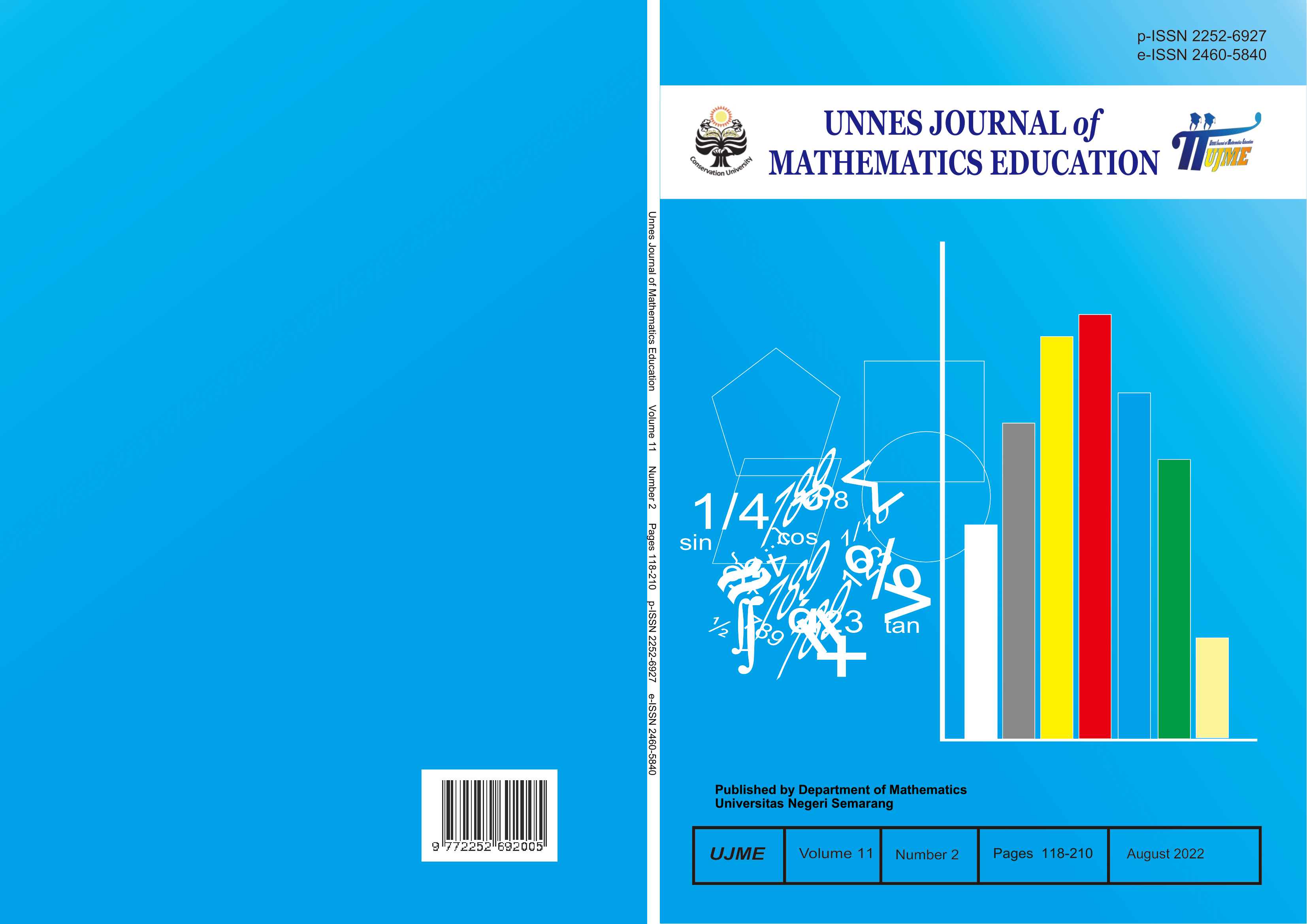Mathematical Critical Thinking Ability in Terms of Students Learning Motivation in Probing Prompting Learning
##plugins.themes.academic_pro.article.main##
Abstract
This research aimed (1) to analyze the effectiveness of Probing Prompting learning on students' mathematical critical thinking skills and (2) to describe mathematical critical thinking skills in terms of students' learning motivation in learning with the Probing Prompting model. This research method was a combination research method (mixed method) with the type of Explanatory Sequential Design. The results showed that: (1) the mathematical critical thinking ability of the Probing Prompting class achieved classical completeness; (2) the proportion of mathematical critical thinking skills in the Probing Prompting class is more than the proportion of mathematical critical thinking skills in the Problem Based Learning class; (3) the average mathematical critical thinking ability of the Probing Prompting class is more than the average mathematical critical thinking ability of the Problem Based Learning class. Subjects with high learning motivation are able to meet all indicators of mathematical critical thinking skills, namely indicators of clarification, assessment, inference, and strategies. Subjects with moderate learning motivation tend to be able to fulfill the clarification indicators; less able to meet the assessment indicators; tend to be able to meet the inference indicators; and able to meet the indicators of strategies. Subjects with low learning motivation tend to be able to fulfill the indicators of clarification, less able to meet the assessment indicators, less able to meet the inference indicators, and tend to be able to meet the indicators of strategies.
##plugins.themes.academic_pro.article.details##
References
Badriyah, N., & Effendi, K. N. S. (2019). Kemampuan Berpikir Kritis Matematis Siswa SMP pada Materi Bangun Ruang Sisi Datar. In Prosiding Seminar Nasional Matematika dan Pendidikan Matematika. Karawang.
Cahyani, A., Listiana, I. D., & Larasati, S. P. D. (2020). Motivasi Belajar Siswa SMA pada Pembelajaran Daring di Masa Pandemi Covid-19. Jurnal Pendidikan Islam, 3(1), 123-140.
Creswell, J. W. (2016). Education Research: Planning, Conducting and Evaluating Quantitative and Qualitative Research Fourth Edition. Boston: Pearson.
Gumelar, F. (2016). Efektivitas Metode Probing Prompting Learning dalam Pembelajaran Menulis Argumentasi. Riksa Bahasa, 2(2), 168-173.
Hazarida, R., Deswita, H., & Richardo. (2015). Analisis Motivasi Belajar Matematika Siswa Kelas VIII SMP Negeri 1 Rambah Hilir. Jurnal Mahasiswa Prodi Matematika UPP, 1(1), 1-4.
Kadarsono, M., Suyitno, H., & Waluyo, B. (2019). Mathematical Critical Thinking Ability of Students in CTL Learning Based on Cognitive Style. Unnes Journal of Mathematics Education Research, 8(1), 89-95.
Kriegbaum, K., Becker, N., & Spinath, B. (2018). The Relative Importance of Intelligence and Motivation as Predictors of School Achievement: A Meta-Analysis. Educational Research Review, 25, 120-148. doi: 10.1016/j.edurev.2018.10.001
Kuhlthau, C. C., Maniotes, L., & Caspari, A.. 2007. Guided Inquiry: Learning in the 21st Century. In School Libraries Worldwide (Vol. 16, Issue 1).
Moslem, M. C., Komaro, M., & Yayat. (2019). Faktor-faktor yang Menyebabkan Rendahnya Motivasi Belajar Siswa dalam Mata Pelajaran Aircraft Drawing di SMK. Journal of Mechanical Engineering Education, 6(2), 258-265.
Muhammad, M. (2016). Pengaruh Motivasi dalam Pembelajaran. Lantanida Journal, 4(2), 87-97.
National Research Council. 1989. Everybody Counts: A Report to the Nation on the Future of Mathematics Education. Washington, DC: The National Academies Press. Available at https://doi.org/10.17226/1199
Ng, B. L. L., Liu, W. C., & Wang J. C. K. (2016). Student Motivation and Learning in Mathematics and Science: A Cluster Analysis. Int J of Sci and Math Educ, 14, 1359-1376. doi: 10.1007/s10763-015-9654-1
Nitami, M., Daharnis, & Yusri. (2015). Hubungan Motivasi Belajar dengan Prokrastinasi Akademik Siswa. Konselor, 4(1), 1-12.
OECD. (2019). PISA 2018 Results Country Note Indonesia. Available at https://www.oecd.org/pisa/
Prameswari, S. W., Suharno, & Sarwanto. (2018). Inculcate Critical Thinking Skills in Primary Schools. Social, Humanities, and Education Studies (SHEs): Conference Series, 1(1), 742-750.
Saptono, Y. J. (2016). Motivasi dan Keberhasilan Belajar Siswa. Jurnal Pendidikan Agama Kristen Regula Fidei, 1(1), 189-212.
Shadiq, F. (2009). Model-model Pembelajaran Matematika SMP. Yogyakarta: PPPPTK Matematika. Available at http://facultycenter.ischool.syr.edu/wp-content/uploads/2012/02/Critical-Thinking.pdf
Steinmayr, R., & Spinath, B. (2009) The Importance of Motivation as a Predictor of School Achievement. Learning and Individual Difference, 19, 80-90. doi: 10.1016/j.lindif.2008.05.004
Sulistianingsih, P. (2016). Pengaruh Kecerdasan Emosional dan Motivasi Belajar terhadap Kemampuan Berpikir Kritis Matematika. Jurnal Kajian Pendidikan Matematika (JKPM), 2(10), 129-139.
Theriana, A. (2020). Pengaruh Model Pembelajaran Probing Prompting Learning terhadap Hasil Belajar Siswa SMA Nurul Amal. Jurnal Ilmiah Bina Bahasa, 13(1), 12-26.
TIMSS. (2015). TIMSS 2015 International Results in Mathematics: Fourth Grade Mathematics. USA: TIMSS & PIRLS International Study Center. Available at di timss2015.org/download-center
Utami, D. (2016). Penerapan Model Pembelajaran Probing Prompting Dalam Pembelajaran Mengabstraksi Teks Negosiasi Pada Siswa Kelas X SMA/MA. Riksa Bahasa, 2(2), 151-158.
Williams, K., & Williams, C. (2011). Five Key Ingredients for Improving Motivation. Research in Higher Education Journal, 11, 1-23.
